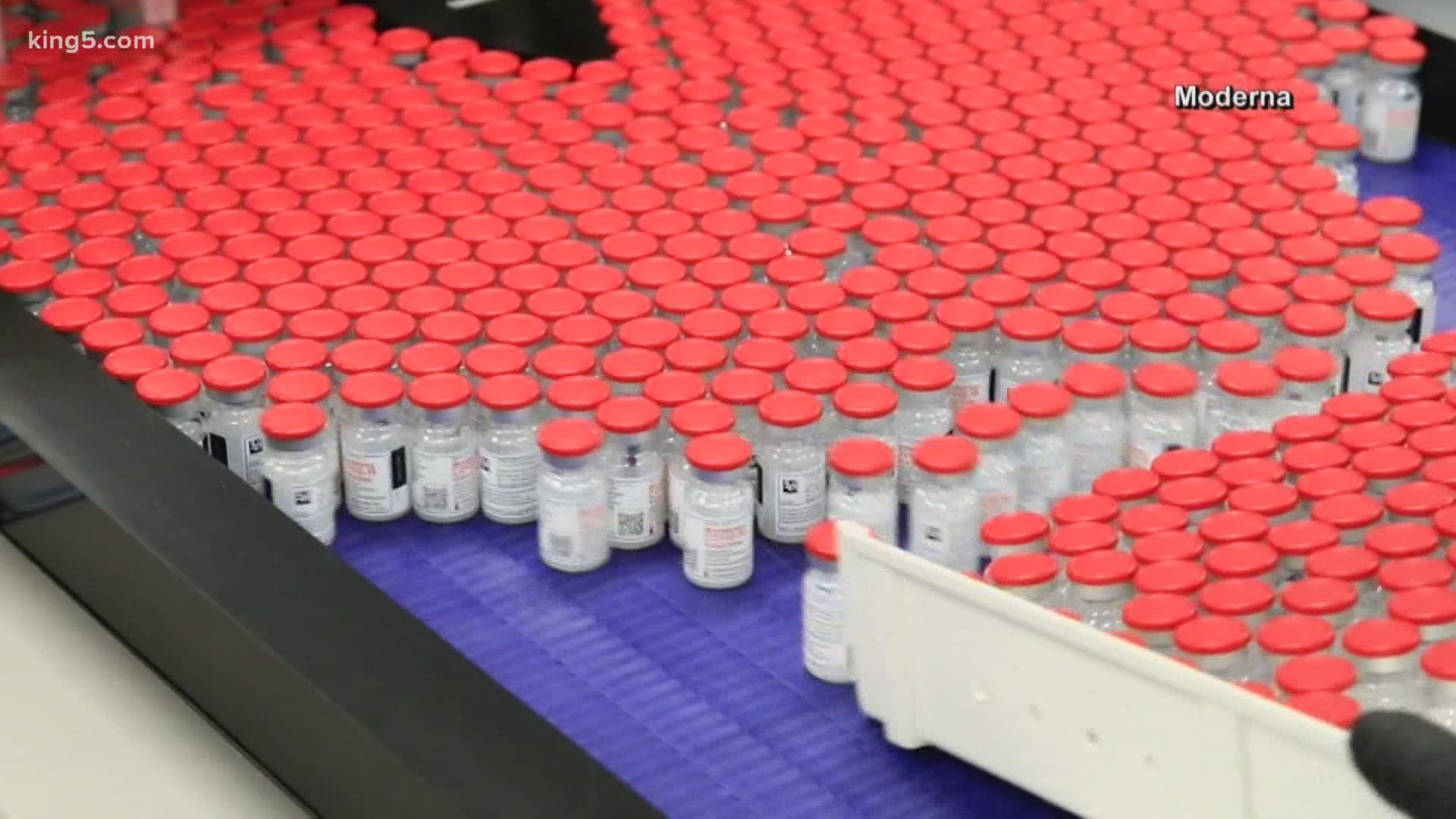SEATTLE — While only 24% of the state's COVID-19 vaccines have been administered, we’re hearing some clinics are put in a tough spot with thawed vaccines and tight timelines.
The Washington State Hospital Association (WSHA) said it’s not happening often, but in some cases, doses are being thrown out.
A tip was sent into KING 5 by an employee at a MultiCare facility.
They did not want to be part of the story, but said some doses of the vaccine were being thrown away at the end of the shifts because state guidelines made it hard to give doses to people who don’t meet the 1A criteria.
Washington State Hospital Association CEO Cassie Sauer said if this happens, it’s only a few doses at a time.
“If you’re doing 500, 700 doses a day, to end up at the end of the day with three leftovers, you know, we’d like there to be zero but that’s a hard ratio to hit,” Sauer said.
It has to do with the strict guidelines for storing COVID-19 vaccines to keep them effective. For example, each vial of the Moderna vaccines has 10 doses in it. If somebody doesn’t show up for a scheduled appointment to get the vaccine, the clinic is left with an extra dose. And that dose cannot be saved for the following day because it expires quickly after it’s thawed.
“Throwing vaccines away is terrible, giving someone an ineffective vaccine is worse. So, we’re trying to avoid all these problems,” Sauer explained. “We sought guidance from the Department of Health early on to say, 'What do you do in this circumstance?' And their guidance is to make every attempt not to waste a dose.”
The governor recently expanded the state’s phase 1A of vaccine allocation. This has helped in preventing more doses from going to waste, Sauer said.
“Before the governor expanded 1A we were interpreting that to mean, go to the engineering department, you’ve got three doses left, go to your engineering department and say, ‘three of you come here now, we can vaccinate you right this minute.’ It also might mean finding patients who are in the 1B category.”
The Department of Health sent this statement to KING 5 regarding the vaccine doses and ways to make sure they do not go to waste.
"We've seen a few cases of vaccine excursion, usually with it being out of temperature range. In those cases, they are referred to Moderna or Pfizer, and the manufacturer lets them know viability. There have also been a few cases when people didn’t know to what to do with ‘extra’ vaccine – who to give vaccine to if they can’t find a 1A person. Providers in that situation are asked to make a clinical judgment about who should receive the vaccine. One reason DOH expanded Phase 1A to add tier 2 was so that those who have vaccinated their tier 1 employees can begin vaccinating in tier 2."
MultiCare provided this statement to KING 5:
“Every effort is made to ensure all doses are given and nothing is wasted from our vaccine allotment from the state. We minimize any vaccine waste by monitoring vaccine supplies against appointments scheduled, transferring doses to other sites as appropriate, and will be rolling out an on-call list to be utilized for any remaining open doses near the end of a clinic’s hours. We have been proud of the hard work and creative thinking our employees from nursing to logistics to information technology and more have shown as we undertake vaccine administration at this scale. We will no doubt have learnings along the way and need to make quick adjustments — as we have throughout this pandemic — but as a community health partner we are committed to doing the hard work to make as many vaccines available for our community as quickly and safely as possible.”
“I think to continue to have a backup list is probably the best plan,” Sauer said, “We’re focusing on the big numbers to make sure that it all gets used. So, we’re making sure that 500 doses of Pfizer don't end up in the trash because they’re expired.”
WSHA is working to facilitate the transfer of large amounts of vaccines from facilities that are having trouble administering them to other facilities that can administer them quickly, so they don’t expire.
“We’re really concerned about making sure we’re moving any vaccine that is on the brink of, not even on the brink of expiration. We want to know two weeks in advance of when it could expire so what we can get that moved and get it used,” she said.

